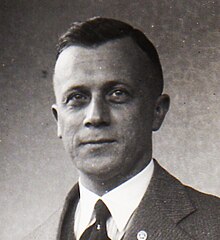Alfred Lublin
Alfred Lublin (born May 4, 1895 in Bischofsburg , † August 20, 1956 in Sucre ) was a German doctor and diabetologist . As a student of Oskar Minkowski and later of Gerhardt Katsch , he was significantly involved in diabetes research in Germany from the mid-1920s and was appointed associate professor of internal medicine at the University of Greifswald in 1932 . Due to his Jewish descent, however, he had to leave the university in 1934, and five years later he emigrated to Bolivia , where he worked as a doctor in private practice until his death.
Life
Alfred Lublin in 1895, the eldest son of his parents in Bishop's Castle was born and attained 1913 at Wilhelms-Gymnasium in Königsberg the High School . He then studied, with several interruptions due to his military service during the First World War , medicine at the University of Geneva , the Königsberg Albertina , where he took the medical preliminary examination in 1916, and at the University of Halle . In Königsberg he became a member of the Germania fraternity in the spring of 1914 . After taking the state examination in Halle in September 1919, where he also received his doctorate in the same year , he first went to the Pathological Institute of the University of Königsberg and in May 1920 to the Medical Clinic of the University of Breslau . Here he devoted himself as an assistant doctor under his federal brother Oskar Minkowski to the research and treatment of diabetes mellitus , especially the metabolism of carbohydrates . In 1921 he married Lilly Völckers in Kiel , and the marriage resulted in a daughter. In 1925 he was with a thesis on metabolism in obesity habilitation , then he stayed in Wroclaw as a lecturer .
In 1929 Alfred Lublin moved to the University of Greifswald , where Gerhardt Katsch had been appointed to the chair of internal medicine a year earlier . In September 1930 Katsch founded a diabetic home in Garz on the island of Rügen , Alfred Lublin devoted himself to examining the first 300 patients treated in Garz and, together with Katsch, to developing a concept called “ productive care ” for the treatment of diabetes Combination of insulin intake , adapted diet , physical activity and patient education. After completing his habilitation in Greifswald, he was appointed adjunct professor at the university in 1932 at the intercession of Katsch, and from April 1933 he was senior physician at their medical clinic. In 1934, however, due to his Jewish descent , he was given leave of absence for two semesters, and his examination permit was withdrawn. After his leave of absence had expired, he was removed from the university's teaching staff on October 1, 1935.
After an application for a professorship in Ankara was unsuccessful in the summer of 1935 , Alfred Lublin went back to Königsberg and took over a private internist practice there. From there, he probably emigrated to Lithuania at the end of 1938 . In September 1939 he emigrated to Bolivia because he had received an application from the rector of the university in the Bolivian capital Sucre . Since his salary as a university professor in Bolivia was not enough to make a living and he was not allowed to work in private practice because he had not passed the medical examination in the country, he switched to a job as a radiologist in a mining hospital in Oruro . He worked there for six years and was preparing for the Bolivian state examination, which he finally passed successfully. Since he could not endure life in the high altitudes of Oruro, he opened a private practice in Sucre, where he lived until his death. Although he had received Bolivian citizenship in 1947, he probably tried to return to Germany after the end of the war. He died in Sucre in 1956 of complications from a heart attack .
Works (selection)
- The influence of insulin on the utilization of carbohydrates in the non-diabetic organism. A contribution to the question of fattening diets with insulin. In: Naunyn-Schmiedeberg's Archives for Pharmacology. 115/1926. Pp. 101-116
- Studies on the utilization of carbohydrates in the non-diabetic organism. In: Naunyn-Schmiedeberg's Archives for Pharmacology. 125/1927. Pp. 229-241
- Productive diabetic care. A report on the goals and experiences of the first German diabetic home in Garz on Rügen. Leipzig 1932
literature
- Günter Ewert, Ralf Ewert: Emigrants from the Medical University Clinic Greifswald in the time of National Socialism: Victor van der Reis, Alfred Lublin, Heinrich Lauber. Pro Business, Berlin 2011, ISBN 978-3-86386-025-7 , pp. 41-71
- Günter Ewert, Ralf Ewert: Alfred Lublin (May 4, 1895 to August 20, 1956) has a face again. In: Contemporary history regional. Messages from Mecklenburg-Western Pomerania. 13 (2) / 2009. Published by the history workshop Rostock e. V., pp. 62-72, ISSN 1434-1794
- Alfred Lublin. In: Harry Scholz, Paul Schroeder: Doctors in East and West Prussia: Life and achievement since the 18th century. Holzner, Würzburg 1970, pp. 281/282
- Heinz Schneider: Medical history in Mecklenburg-Western Pomerania. Who was Professor Dr. Alfred Lublin? In: Ärzteblatt Mecklenburg-Vorpommern. 19 (1) / 2009. Medical Association Mecklenburg-Western Pomerania, p. 22/23, ISSN 0939-3323
- Margret Heitmann , Julius Hans Schoeps, Bernhard Vogt: Keep away from the whole country any ruin ... History and culture of the Jews in Pomerania. Georg Olms Verlag, Hildesheim 1995, ISBN 3-487-10074-6 , p. 436
- Hans Michael Dittrich: Alfred Lublin (1885–1956) and his contribution to diabetology. In: Journal for Medical Training. 79/1985. Academy for Medical Training in the GDR, pp. 361–363
| personal data | |
|---|---|
| SURNAME | Lublin, Alfred |
| BRIEF DESCRIPTION | German doctor and diabetologist |
| DATE OF BIRTH | May 4, 1895 |
| PLACE OF BIRTH | Bischofsburg , East Prussia |
| DATE OF DEATH | 20th August 1956 |
| Place of death | Sucre , Bolivia |


